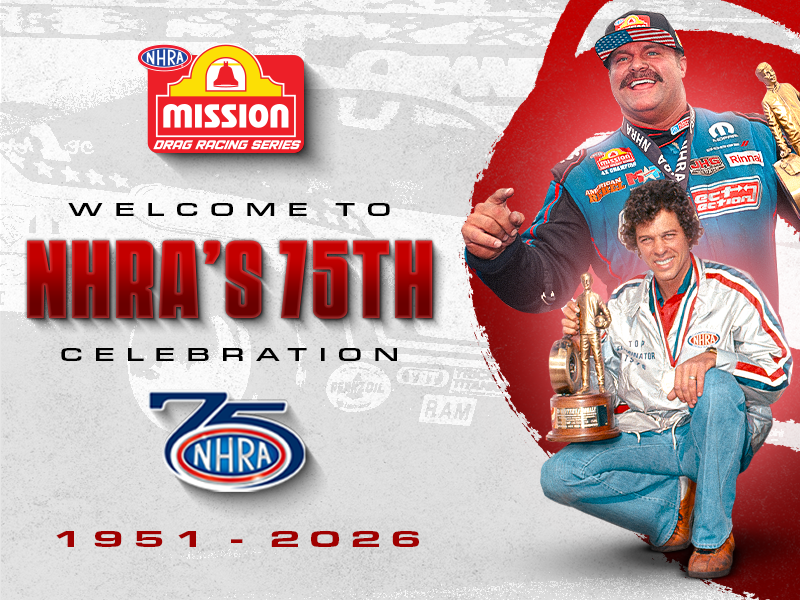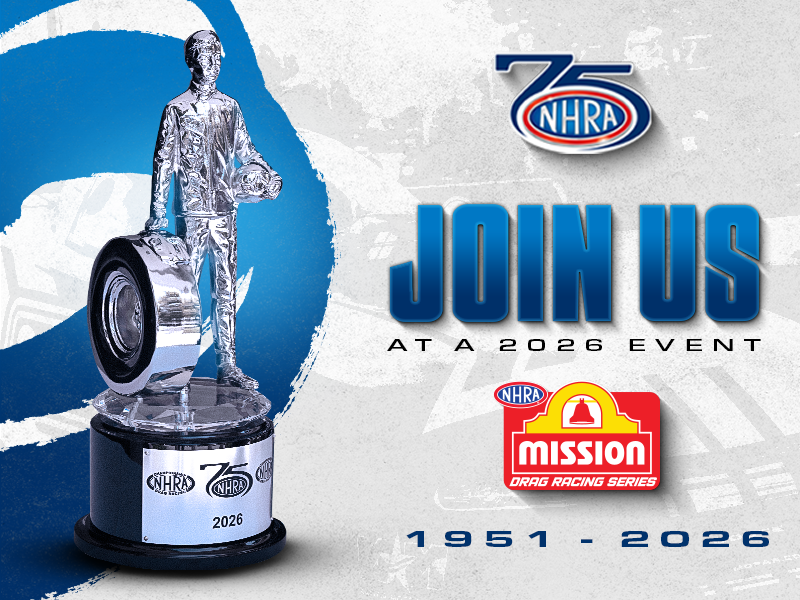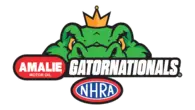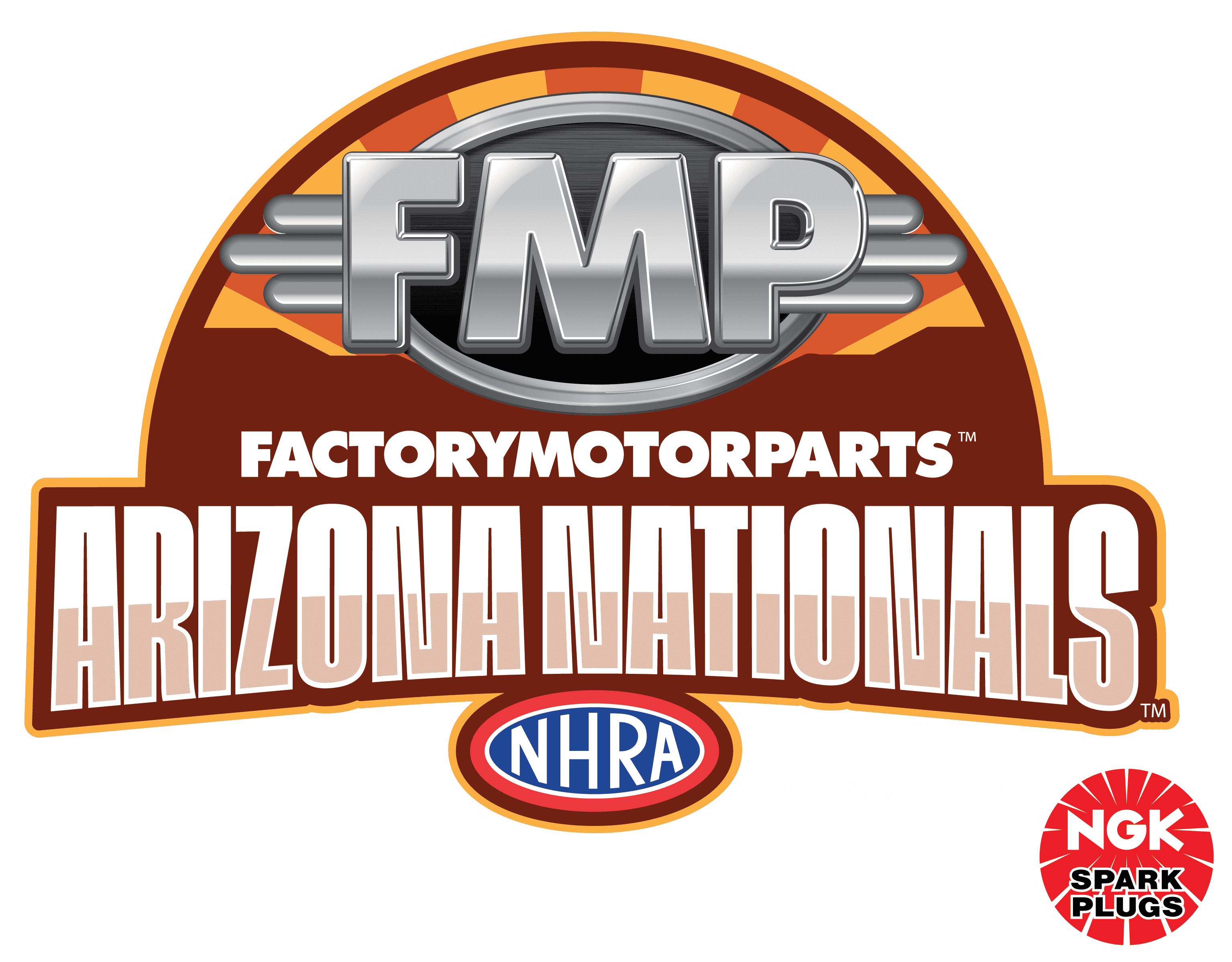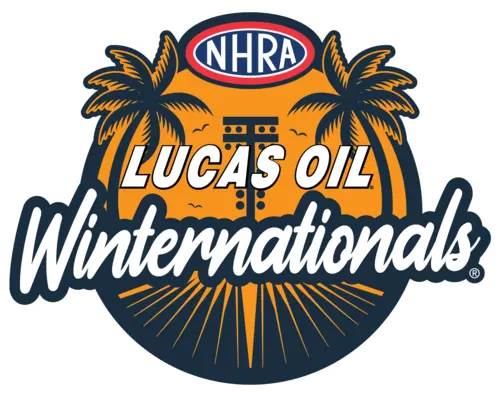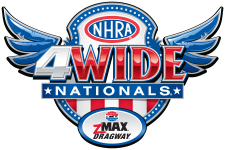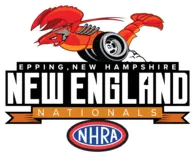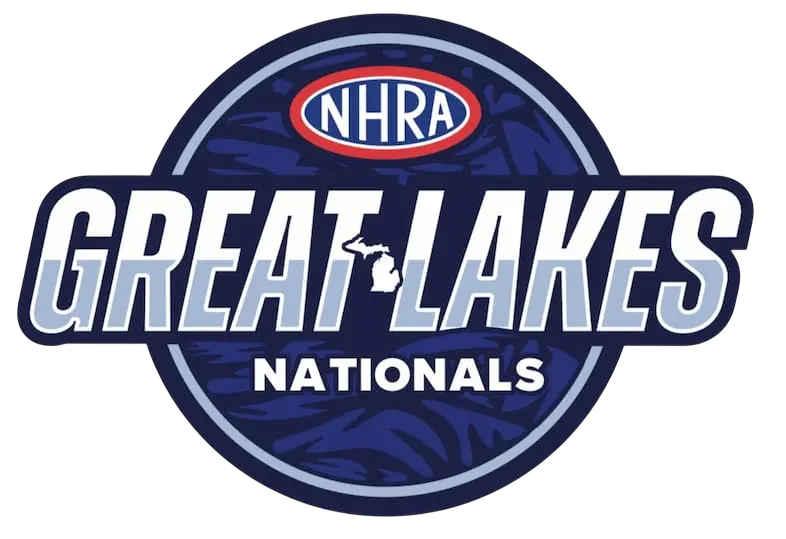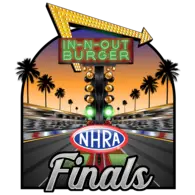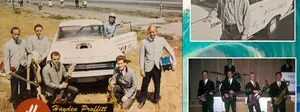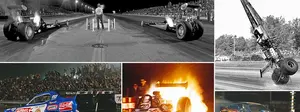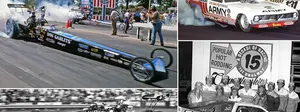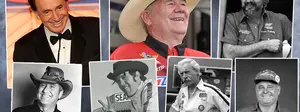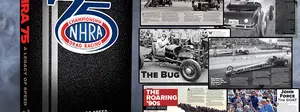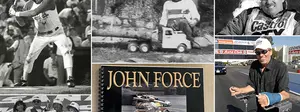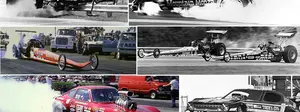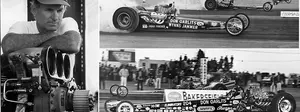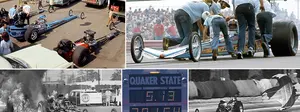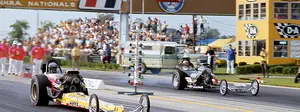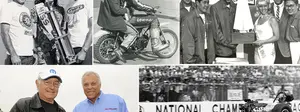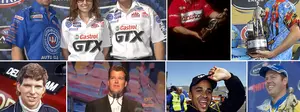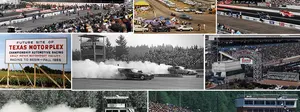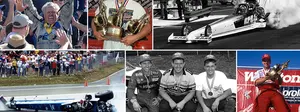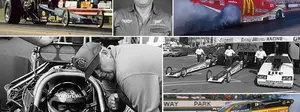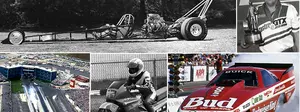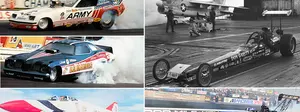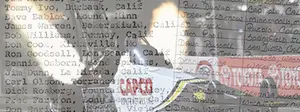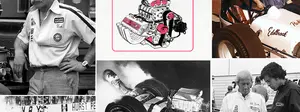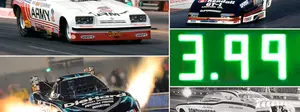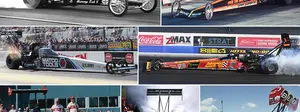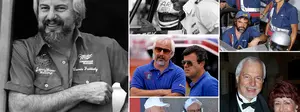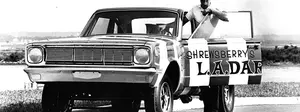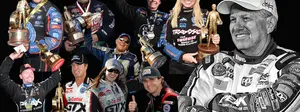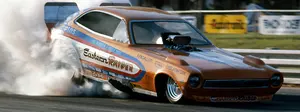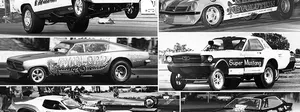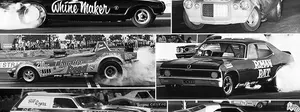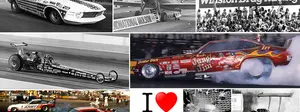Dave Miller: Diamond in the rough
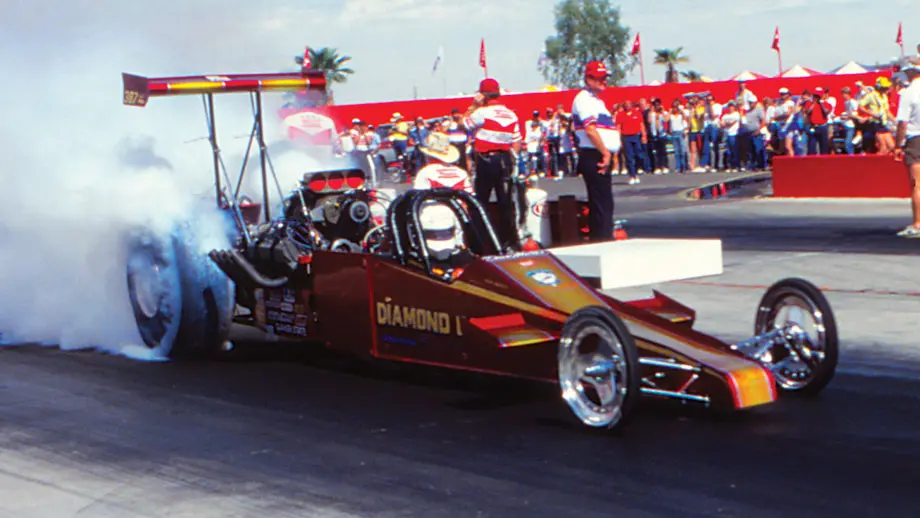
Innovation and experimentation were early hallmarks of drag racing competition, with cars like Lloyd’s Scott Bustle Bomb, the Allison-powered Green Monsters, Jack Chrisman’s sidewinder, and Mickey Thompson’s Panorama Special streamliner showing that all you needed was a little imagination and a lot of balls to try something new.
As NHRA rules became more refined and the financial and sponsorship stakes grew bigger, the box became smaller. Evolutionary-design success all but made experimentation extinct, especially in Top Fuel. With Corporate America sponsors to please, wins meant everything and winning meant copying other winners. Al Swindahl has a virtual monopoly on Top Fuel chassis in the early 1980s.
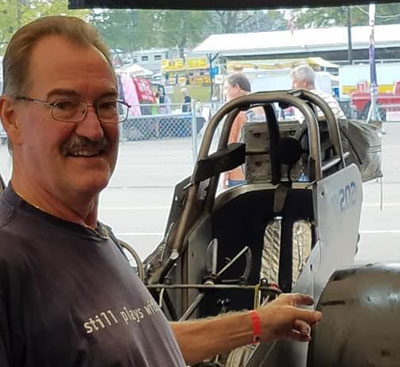
And then there was “Diamond Dave” Miller, maybe not the last of the mavericks (I’m looking at your, Jim Head) but certainly the most memorable. In 1984 Miller unveiled a wild Top Fuel dragster with just a 200-inch wheelbase, a full five feet shorter than his peers, and made fans from coast to coast.
Miller died Sept. 5 at age 74 of pneumonia, the final cruel blow in a long battle with a blood infection after beating cancer two years ago. Illness took him from us, but the memory he left behind is everlasting.
Revolutionary and sometimes controversial chassis builder Scotty Fenn, one of the first commercial chassis builders in the late 1950s, once posited a formula that the chassis length of a dragster should never exceed the circumference of its rear tires, which in those days was about 90 inches.
Today’s rear Goodyears for the nitro ranks have a maximum circumference of 118 inches, but today’s Top Fuelers have wheelbases of about 300 inches, not necessarily proving Fenn’s five-decade-old maxim wrong, but time and technology changes everything. From 150-inch long dragsters of the early 1960s to the 200-inch slingshots of the early 1970s, chassis length only grew as the cars went faster. When Joe Amato broke the 260-mph barrier in 1984, his car sported a 255-inch wheelbase.
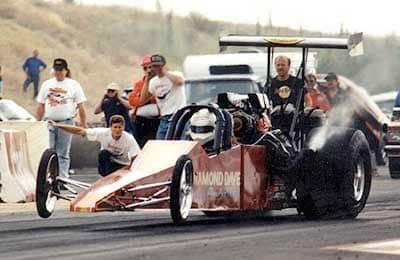
Miller’s shorty — affectionately dubbed “Little Red” -- debuted in 1984, the same year that Amato’s revolutionary tall-winged dragster did, and maybe caused as big a ripple despite obvious differences in approach and theory.
From the outside, it appeared to have “freakshow” written all over it, with the driver sitting pretty much in the middle of the layout with his feet practically touching the front axles and canard wings sometimes attached to the sides just forward of the cockpit. Most expected it to go away after a few misguided attempts, but instead, it propelled Miller, a theretofore relative unknown in the class despite nearly a decade of experience, into the hearts of the fans and ultimately proved to be a strong runner.
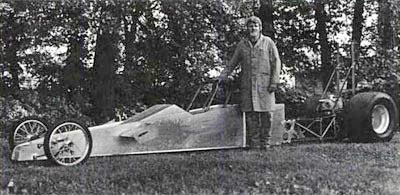
Most fans didn’t know that the designer of the car wasn’t some zonked out mad scientist but was in fact well-regarded Wisconsin chassis builder Dennis Rollain (pictured right), who once was partnered with the famed Lil’ John Buttera in a company known as R&B Race Cars. After Buttera moved to California to find fame and fortune as a builder of exotic and revolutionary Funny Cars, Rollain remained in Kenosha, Wis.
According to Dr. Robert Post’s authoritative book, High Performance, the Culture and Technology of Drag Racing, Rollain struck a deal with Miller: He would build him a chassis if Miller would race it to test his theories. At the time, the consensus among the top chassis builders, like Swindahl and Dave Uyehara, was that the dragsters needed to “arch up” in the middle — with the front wing planting the front tires and rear wing holding down the back -- but Rollain, who passed away in 2010 after being struck by a car, believed that was wasting a lot of energy, and, besides, at the time, some of the Funny Cars with 125-inch wheelbases were running almost as fast (and, on a few occasions, faster) as the Top Fuelers, so why did the dragsters have to be that long?
The car was met with skepticism by not only fans but officials and fellow racers. When the car made its debut at the winter Turkey Trot event in Bradenton, Fla., then-Division 2 Director Lex Dudas gave it a thorough look over before allowing it to run, and when Miller submitted it for official tech at the Gatornationals the next year, it spent more than five hours in tech as inspectors went over it with a fine-tooth comb — it had square tubing from the roll cage back which, while not illegal by the letter of the rulebook, still was frowned upon (“It was built like a bridge, and the chassis had more in common with a Pro Stocker than a Top Fueler,” remembers Miller) — before finally declaring it ready for competition.
Fellow Illini Top Fuel racer Chris Karamesines and Don Garlits both approved of the effort, but Don “the Snake” Prudhomme took one look at it and declared that he’d never even sit in it let alone drive it. Two other legends, Connie Kalitta and Tim Richards, even offered their tuning help to Miller after an especially explosive pass in Brainerd, but Miller foolishly (his word) declined.

The car surely was fun to watch. It initially had a propensity for carrying entertaining two-foot-high wheelstands off the line, which seemed exaggerated by its short size. Once Miller got a better handle on the clutch and made some adjustments to the rear-end gearing, the car still wheelstood, but not nearly as high, and the performances improved. Miller seemed a fearless pilot, and despite the relative bucks-down nature of his operation, I don’t remember seeing him fireball the engine or oil the track often.
Miller’s “shorty” never outran the big boys, but it certainly ran with them for a few years, running into the 5.30s and generally qualifying mid-pack. Miller’s greatest moment in the car came at the 1985 Fallnationals in Phoenix, where, after qualifying No. 9, he reached the semifinals. Sure, his first-round victory over low qualifier (back then, No. 1 raced No. 9 not No. 16 as today) Gary Ormsby came after Ormsby’s Castrol streamliner suffered a flat tire on the burnout, but he also outran an off-pace Darrell Gwynn in the second round before Dick LaHaie ended the Cinderella story in the semifinals.
“If I had more money, it would have done better,” Miller told me a few years ago. “When we brought the car out, a lot of guys were running dual magnetos and two-plug heads while we only had enough money to run one magneto and one plug. I did catch up, eventually, but we were buying used, more-obsolete equipment from people like the Kalittas.”
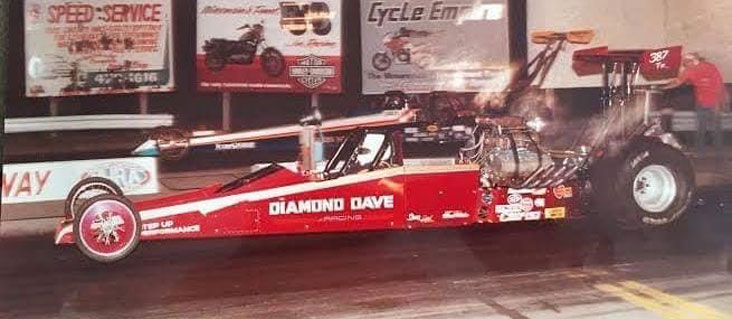
The car ran on the NHRA tour in 1985 and 1986 before rules amendments made its roll cage illegal (tubing too small), but he continued to run IHRA, AHRA, and match race events for several years before the car was legislated out of national event competition by a rule that required cars to be at least 250 inches in wheelbase. NHRA’s current rule prohibits Top Fuelers with a wheelbase with less than 280 inches.
He continued to run the car at match races for years after before it was finally parked. The car sat behind Rollain’s shop until Miller got it back, intending to preserve a unique part of the class’ history. In 2013, the car was donated to Garlits for future inclusion in his Florida-based Museum of Drag Racing.
“It definitely belongs in a museum,” said Miller. “It was a great car. I had a lot of fun with it.”
The car is not currently on display and still awaiting or undergoing restoration.

Miller had a career both before and after “Little Red.” DragList shows him competing in Alcohol Dragster as early as 1972, shown above in the Ray-Mars photo from the Mark and Laura Bruederle collection, who also kindly supplied a few other photos in this column.

Miller is also credited with driving Top Fuelers as far back as 1969, when he supposedly drove Andy Granatelli’s weird STP wedge (pictured above and featured in this previous Insider column, but, as you can read there, at the time I wasn’t convinced it’s the same guy, though “Diamond Dave” did work at Logghe where the car was built).
Bret Kepner, the preeminent expert on Midwest drag racing, remembers seeing Miller with a more conventional rear-engined car in the late 1970s on the UDRA circuit and beyond.
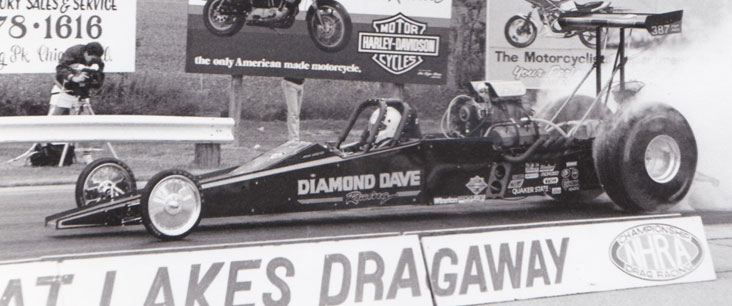
“He holds the record for going to more unknown tracks than me, tracks that were even beyond the UDRA’s normal scope of operations,” said Kepner. “Any time there was a race, he was ready to be there. Union Grove ‘Broadway’ [Bob’ Metzler] booked him into Union Grove [Great Lakes Dragaway] every time he had a race because Davie lived so close. He ran 6.30s, not great by NHRA terms, but solid in UDRA and he didn’t hurt stuff. He just made runs, which, honestly, was all the UDRA asked for.
“Dave had a great sense of humor and loved to race. He was fun to be around.”
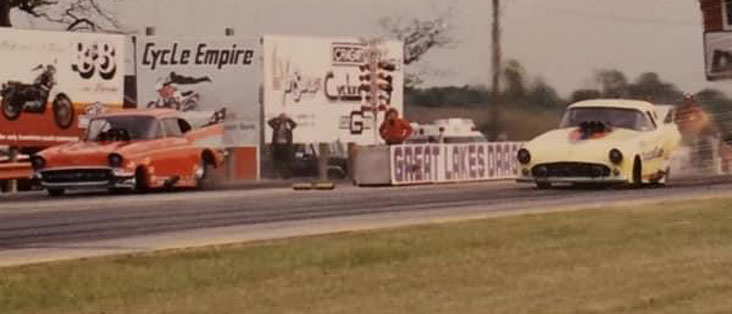
Kepner also recalls Miller also taken advantage of IHRA’s liberal Funny Car body rules in 1988 to run a ’55 Thunderbird alongside the ’57 Chevy of Tom McEwen and the ’56 Ford Crown Vic of Carl Ruth in both national event and match-race competition. “They all made a lot of money that summer,” he noted.

Years after he parked the shorty Top Fueler, Miller hooked up with veteran nitro car owner Charlie Proite — of Pabst Blue Ribbon Funny Car fame -- and fielded what Miller called a “moderately successful” front-engined Telstar Nostalgia Top Fueler. That’s the two of them from Proite’s Facebook page, with Miller on the left. Proite died in December 2014 from complications due to a stroke suffered a week earlier, and Miller subsequently hooked up with John Lorbiecki and Dale Suhr on another slingshot project, and had just handed over the seat to Lorbiecki after sharing his knowledge.
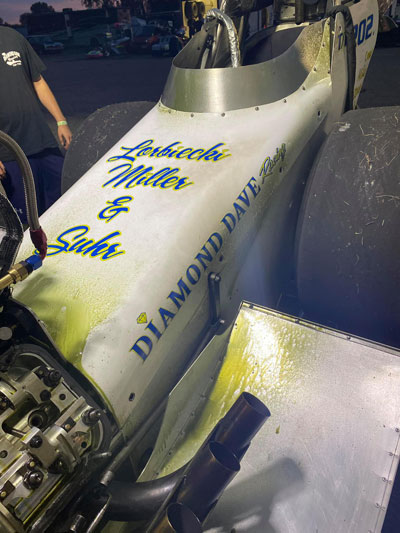
Lorbiecki lamented the loss of Miller on his Facebook page: “Going to miss you, Dave Miller. He was a mentor, teacher, and friend. I’ve known him for 25 years. Went from watching him as a wide-eyed 10-year-old kid, seeing that red and blue fire suit as more of a superhero cape to eventually being a part of his team and learning the intricacies of the sport from him. I feel very lucky to have been able to share his passion for drag racing and watch him haul ass down the strip. It was my true pleasure to share the unique combination of adrenaline and pure joy that comes only from drag racing.
“It was weird, to say the least, running his car without him there Saturday at Great Lakes Dragaway. It weighed heavy on everyone’s minds knowing he wasn’t doing well. What none of us knew was by the time we ran the car he had already passed. I heard someone mention that maybe it was his way of saying goodbye when the engine blew up. In a weird way, it felt like the 200-mph blinding explosion with a little fire and oil bath was him passing the reigns and saying, ‘Welcome to the club, kid.’ Next season will be dedicated to Dave and everything he brought to the sport. His fans, crew, family, and friends will all miss him greatly.”

I also spent some time on the phone with Miller’s wife, Debby Gallagher, whom he met at St, Louis Int’l Dragway in 1989 while he was still running the shorty and wed the following year. She was hands-on with the car, helping him work on it between rounds. They would have celebrated their 30th anniversary this year.
"The photo here is from August 1989 when I first met Dave at St. Louis International," she said. " He was running both the '55 Yellow T- Bird FUnny Car and 'Little Red' and he forgot the headers for the dragster so he to us the ones from the Funny Car. Everyone said they look like cow catchers!"
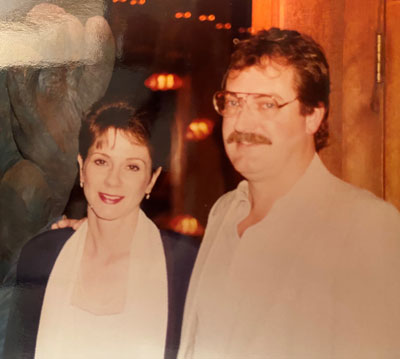
“David loved to race. He was addicted to drag racing; I knew when I married him that drag racing would always come first. Even after he had Carpal Tunnel Syndrome and rotator-cuff surgery he still wanted to do it, and even when he had cancer of the tongue in 2018 and had to have chemo and radiation twice a day, he was ready to get back to racing as soon as his oncologist let him.
“He liked the front-engine car, but what he wanted was a 300-inch Top Fueler; I told him I didn’t make enough money for that. ‘I’m sorry, dear, I’m lucky if I can buy you a barrel of fuel or a blower belt or some slicks. I’m not John Force.’
“He was very determined, very resourceful. He would buy other people slicks or used blower belts, anything to keep racing. He wasn’t too proud to ask for help and people liked to help him. He was personable, and really good with the fans. He knew a lot about everything. He could take apart that car in his sleep and fabricate things. He could do anything. He could remodel a kitchen or a bathroom or a deck — plumbing, electrical, he could do it all.
“He was an amazing guy.”
I’m not going to disagree with that. RIP, “Diamond Dave.”
Phil Burgess can be reached at pburgess@nhra.com
Hundreds of more articles like this can be found in the DRAGSTER INSIDER COLUMN ARCHIVE



